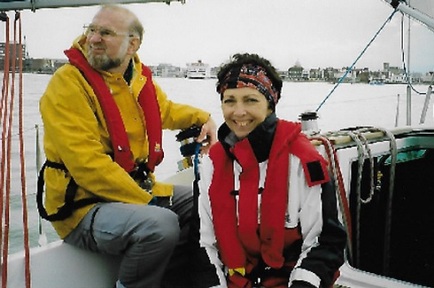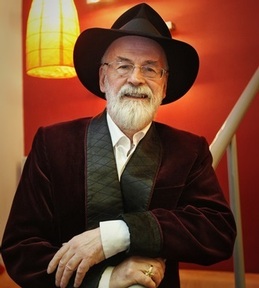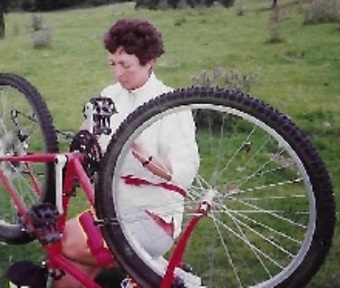Sailing couple forced to give it up after Terry Pratchett's disease strikes
Skippers Trina Armstrong and her husband Graeme are used to sailing around the Caribbean but have had to stop hiring boats to travel the globe together because Trina has a rare form of Alzheimer’s disease which has left her blind.

For a frequent sailor like Trina, motion sickness is now unbearable. Graeme says “We tried a couple of cruises but you’ve got to get around the boat. I think the deterioration of vision has increased her motion sickness.”
Like fantasy author Sir Terry Pratchett, who died in 2015, Trina has Posterior Cortical Atropy (PCA); a form of dementia which affected her sight before her memory.
However, when she retired in 2006 at the age of 60, Trina thought retirement would mean more time to sail, cycle, read and paint with watercolours. It didn't. Trina started struggling to recognise people’s faces and stopped being able to add or subtract.

Terry Pratchett is the author of more than 70 fantasy novels translated into 37 languages. His series of Discworld novels has sold more than 70m copies globally.
Like the famous author, Trina was initially misdiagnosed by doctors who thought she’d had a stroke. It took six years (2012) for her to be told she had PCA.
PCA (Posterior Cortical Atrophy, also known as Benson's syndrome) refers to progressive cell loss (atrophy) as a result of a degeneration of the cortex in a part of the brain located at the back of the head (posterior).
Initially, people with the condition tend to experience problems with their vision, such as difficulty recognising faces. They also have problems with literacy and numeracy, as these tasks are controlled by the part of the brain, where the damage is. As the damage spreads, people develop more typical symptoms of Alzheimer's disease, such as memory loss and confusion.
With sailing: 'you could have control'
Of memories sailing around the Greek Islands, Turkey and elsewhere, Trina says: “We would take friends with us sailing too, but that all had to stop.”
The 71 year-old adds: “I liked seeing new places. You could have control over where you were going.” Life stuck on dry land was also challenging for the couple from Northwood, London. Trina's husband is now her full-time carer. Graeme says: “The difficulty is compounded because firstly Trina is blind. If it was just blindness due to an eyesight problem you can use sight aids, learn how to use them and remember where to put things.
“But with loss of memory too, Trina could put something down and forget where she put it and can’t see to find it. It’s a double whammy. “I have to get out to open the car door for her because Trina can never find the car door handle or remember where it is.”

'It's another activity that's off the list'
The Armstrongs also loved cycling at weekends and used to help their local rowing club organise regattas.
Graeme, who spoke about his wife's condition at The Alzheimer's Show in London this year, says: “Trina would check the crew numbers as they came up to the start of the race, so you know that’s a race you can take. It’s something we’d be involved in all day. It’s another activity that’s off the list.”
Even going for a walk can be risky as Graeme notes ‘it's got to be paved or firm ground’, before adding ‘no cobble stones and hill walking is out of the question’.
In an effort to help his wife, Graeme has learnt how to cook. He says: “I’ve had to learn how to cook. I quite like it, but I’ve had to do it for the last eight years.
Trina says: “My husband is my biggest support”. But she confesses: “Overall combating boredom is a major issue. When I go out, I’m reminded of all the things I can’t do. I can’t go out on my own and go shopping. I don’t want to bump into people and fall off kerbs. I’ve had a few falls.”
Trina loves reading but this solitary hobby has changed to listening to talking books. She can no longer read to her grandchildren admitting “I haven’t been able to read to them since they were small.”
Giving up the dog

Painting watercolours is another lost art for Trina who would create anything from landscapes to animals and her pet dog - who has since gone to a new home.
And yet, swimming is an activity the 71-year-old can continue with the help of a home care worker who takes her to the public swimming pool two hours a week. Graeme says: “Trina is a good swimmer but I can’t go into the ladies changing room to help her”.
Fortunately, Trina is able to find her way around the house, allowing Graeme to leave the house for three hours at a time. He says: “I leave her with a cup of coffee and the radio on”.
“With the loss of sight and memory, learning to use new equipment is almost impossible [for Trina]" Graeme says but adds: “I can call from my mobile to the Amazon Echo ‘Alexa’ in the house and Trina can answer it without touching it.”
Trina says: “I can’t remember the names of my children sometimes. It’s difficult to live with because it gets worse as you get older and how do you cope with this because you don’t want it to get you down?”
The couple like to draw strength from each other, their local Herts PCA Support group and the London-based Rare Dementia Support group.
The Alzheimer’s Society says while there are no specific medications for the treatment of PCA, some people find medications for Alzheimer's disease helpful, as does Trina who has been prescribed donepezil to slow down progression of the disease.
On the subject of what message he wants to send about his wife’s condition, Graeme simply says: “The sooner they find a cure the better”.
For details about London's Rare Dementia Support group visit: www.raredementiasupport.org/pca/
Latest Features News
 28-Nov-19
2019 Election: Labour pledges £10.8 bn for free personal care while Boris Johnson sidelines social care
28-Nov-19
2019 Election: Labour pledges £10.8 bn for free personal care while Boris Johnson sidelines social care
 18-Oct-19
Podcast: Wendy Mitchell and dementia: 'My biggest fear is not knowing who my daughters are'
18-Oct-19
Podcast: Wendy Mitchell and dementia: 'My biggest fear is not knowing who my daughters are'
 30-Sep-19
World's oldest diver aged 96 says 'never accept the fact you are getting old'
30-Sep-19
World's oldest diver aged 96 says 'never accept the fact you are getting old'
 27-Sep-19
Exclusive: Care minister backs care workers' call for time off to grieve and attend funerals
27-Sep-19
Exclusive: Care minister backs care workers' call for time off to grieve and attend funerals
 20-Sep-19
Podcast: Gyles Brandreth urges care workers to learn poetry with elderly
20-Sep-19
Podcast: Gyles Brandreth urges care workers to learn poetry with elderly